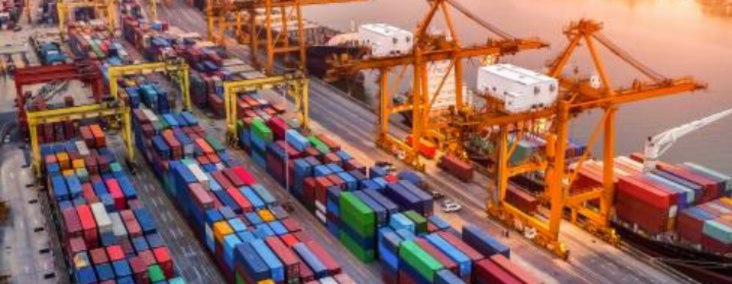The ONS trade data for November 2023 has been released today, which shows goods exports to the EU picked up but overall volumes of both goods imports and exports fell.
This is mainly due to a decline in trade flows with the rest of the world. The trade surplus in services declined slightly in the three months to November, but the trade in goods deficit widened slightly.
In terms of imports, overall goods imports volumes fell by 3.8% (£1.5bn) in November. The main falls in purchases from the EU were in machinery and transport equipment (including aircraft from Germany).
Goods imports volumes from the rest of the world fell by 6.5% (£1.1bn), driven largely by lower sales of cars, electrical machinery and inorganic chemicals imports from China, and reduced imports of pharmaceutical and medicinal products from Switzerland. On the current prices measure goods import values from the EU fell by £0.5bn (1.7%), while the rest of the world saw import values drop by £1.1bn (5.4%) over the same period. Overall, goods imports fell by 3.3% (£1.6bn) on that measure.
Overall goods exports volumes in November fell by 2.8% (£0.7bn). The significant falls in goods export volumes to the EU over the previous two months of 3.4% and 7% respectively were reversed in November with a modest rise of 0.6% (£0.1bn). This was connected to a rise in machinery and transport goods sales, including cars to Italy.
Goods exports volumes to the rest of the world fell by 5.9% (£0.8bn), with lower exports of fuels (particularly crude oil) and material manufactures being the key drivers.
On the current prices measure, without inflationary effects being removed, EU goods export values rose by £0.2bn (1.2%) and non-EU goods fell by £0.8bn (5.0%). The combined figure shows goods exports falling in value by £0.6bn (2.0%).
In relation to services, import and export volumes both fell slightly by £0.1bn. On the current prices measure, there were also slight falls in both import and export values of £0.1bn. Services exports in November were 12% higher, excluding inflation, than in February 2020.
Anne White, Head of International Trade and Compliance, Thames Valley Chamber of Commerce said “”It is disheartening to note the decline in the value of both goods imports and exports for the month of November. Here in the Thames Valley, the results of the most recent Quarterly Economic Survey indicate that only 29% of businesses within the Thames Valley experienced an increase in overseas orders.
“It is therefore crucial that businesses aspiring to engage in international trade receive the necessary support and guidance to effectively connect, trade, and prosper on the global stage.”
William Bain, Head of Trade Policy, British Chambers of Commerce, said “The positives are there was a pick-up in some export sectors in goods trade with the EU, particularly in automotive sales. Services also remained steady for a further month, with only very small declines. But other indicators for November were weak, particularly on imports.
“Looking ahead the picture is only likely to worsen as the effects of the disruption to shipping in the Red Sea, and through the Suez Canal, begin to be fully felt. The Kiel Institute this week estimated global trade fell by 1.3% in December due to the initial impact.
“These are stark numbers – the fall in containers taking this route, from the East, amounts to 300,000 per day. This suggests only 40% of normal sea freight traffic is currently travelling via the Red Sea. This is a significant challenge, especially when combined with the other global headwinds which traders are facing in the early weeks of 2024.”

